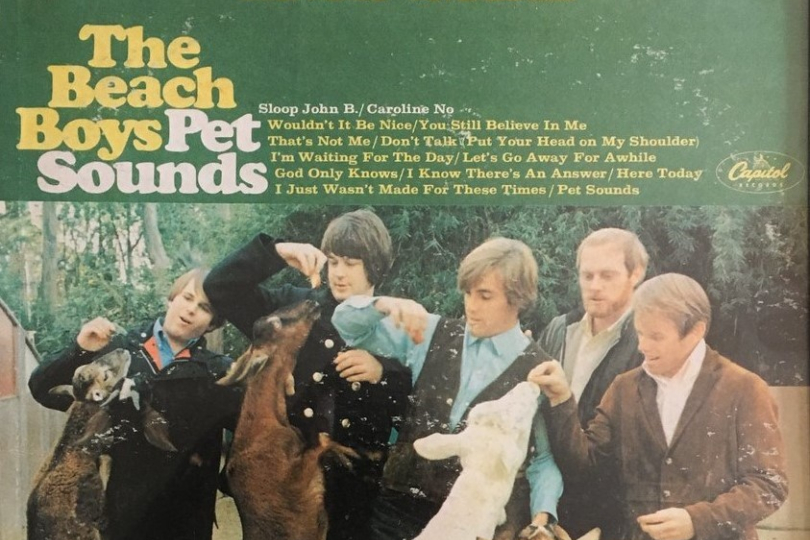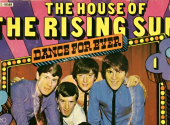
Story of a Hit #15: "God Only Knows"
The Beach Boys have had a prolific career, cementing a genre of music, pushing the boundaries and becoming one of the greatest bands in popular music. They had a number of great hits through their heyday in the 60s, but today we're looking at "God Only Knows", a song regarded by many as the pinnacle of songwriting.
Generally regarded as one of the best pop songs ever recorded, it also gets described as a "baroque-style love song", so that should certainly tickle your interest. But its accolades know no bounds, with Paul McCartney himself having said that it's "the greatest song ever written" while Bono described the string arrangement as "fact and proof of angels".
But before we get into what makes "God Only Knows" so special – its musical complexities, angelic sound and unique quality – let's talk a little bit about the powerhouse of a band that pretty much defined an era of music.
The Beach Boys started out as a garage band in 1961, a family affair, made up of three brothers Brian, Dennis and Carl Wilson, their cousin Mike Love, and managed by the sibling's father, Murry Wilson. They hit it big with the song "Surfin' U.S.A." in 1963, which today is a quintessential example of the prolific style of surf music, which went on to inspire and influence so many genres of music that followed.
Following their first top 10 single with "Surfin' U.S.A." the band had a string of successes – they captured the spirit of surf culture, of youthful freedom, of the summer life – and started the phenomenon known as the Californian sound.
Of course, surf music already existed before the Beach Boys entered the scene, as an instrumental genre pioneered by the likes of Dick Dale, and blended electric guitars with iconic effects like spring reverb and rapid finger-picking. Apparently, when the band first started playing gigs, they were so unlike what most people associated with surf music, that teenagers used to throw vegetables at them.
But it was the Beach Boys that added vocals to surf music, transforming the genre and eventually, according to author Luis Sanchez, "creating a direct passage to California life for a wide teenage audience".
It was in those complex vocal harmonies, the interweaving of various parts that the Beach Boys began to shine out from over bands of the era. Arguably, it's also what made them stand out enough to resist the "British Invasion" – the term used to describe the influx of British bands and culture, like the Beatles, that pushed away interest in local American acts.
It was the album All Summer Long (1964) where Brian wrote his last surf songs, and which already featured some of the quirky elements that would become central to future hits, like the orchestration of piccolos and xylophone. It came from a desire to move away from the old surf sound and embrace some of the new things the Beatles were doing, for example, he was a huge fan of Phil Spector.
In 1965, Brian premiered this new sound with the album The Beach Boys Today, which let go of cars and surf culture as thematic material, embraced orchestrations reminiscent of Phil Spector and started a new lyrical approach. According to biographer Nick Kent, Brian's songs "were suddenly no longer simple (and) happy ... instead, they'd become highly vulnerable, slightly neurotic and riddled with telling insecurities." The evolution of the Beach Boys' sound was truly underway.
So in 1966, Pet Sounds was released, opening with the iconic track "Wouldn't it Be Nice", which today is certainly one of their most famous songs.
Pet Sounds was the Beach Boy's eleventh studio album, and while it was initially met with limited popularity in the States, it shot to number 2 in the UK and sat in the top 10 for 6 months. It was marketed for its progressiveness, and deservingly so, because today it is regarded as one of the most important, sophisticated and influential albums of all time. It advanced the field of music production and set a whole new standard for music composition in pop music.
This is the context in which "God Only Knows" comes to be – remember, that's what we've been leading to this whole time. To appreciate it fully, it helps to understand the journey that the Beach Boys made to get there, but also there is a really good argument for listening to the entirety of its parent album.
Why "God Only Knows" stands out, even amongst the other gems on Pet Sounds, is because it is quintessentially a Beach Boys song, in terms of that new sound they pioneered and worked on over the years, but also because it is remarkably unique and sophisticated. So once again, here it is, featuring a new music video released in 2022 as a 4 part video series.
There have been several good musical analyses of this hit, so we don't need to go into that too deeply. While the lyrics themselves are not particularly complex or lengthy, they touch a special nerve, due to their directness, repetition and the use of the word "God" (also, at that time using the word God in a song was a bit of a taboo). While starting with the lyric "I might not always love you" is somewhat bold for a love song, in many ways it sets the tone, and sets up a beautiful contrast to the retrospective chanting of "God only knows what I'd be without you".
But it's the glorious chord progression that stands out so powerfully, sets the tone for the whole song and creates a beautiful journey through every verse, the playful instrumental, to that final repetitive chorus. The way the melody, and later the vocal rounds interweave and interact over it is pure magic. This is one of the reasons it gets described as a baroque-pop song, along with the use of various orchestral instruments to create that complex layering of instruments.
The chord progression fluctuates between two tonal centres, creating a push and pull in emotion that never leaves you feeling like you know exactly where you are. The verse takes you from A major to E major, using some fantastic inversions, due to its moving bassline. While the chorus itself, which features a much more simplified chord progression only gets 4 bars of attention. This is its genius, the whole song draws you to the coda, touching on the idea of those 4 bars of chorus, but only giving you the briefest taste. It leads you to the climax of vocal harmonies, to the chant of "God Only Knows", the layering of instruments and a true celebration of that Beach Boys' sound. This one is for the music nerds.
Imagine Brian Wilson for a second: it's 1965, he's been searching for a new way to explore music and sound, to elevate his compositions to a new level. And then he strikes this thing of perfect musical beauty, changing the way musicians think about the genre of popular music forever.
He said in 1976, that if McCartney's assertion was true – that "God Only Knows" was "the greatest song ever written" – then "what was there left for me to do?".
What do you think, is "God Only Knows" the greatest song ever written? What would you pick?
Let us know your opinion in the comments below!
If you have found an error or typo in the article, please let us know by e-mail info@insounder.org.





